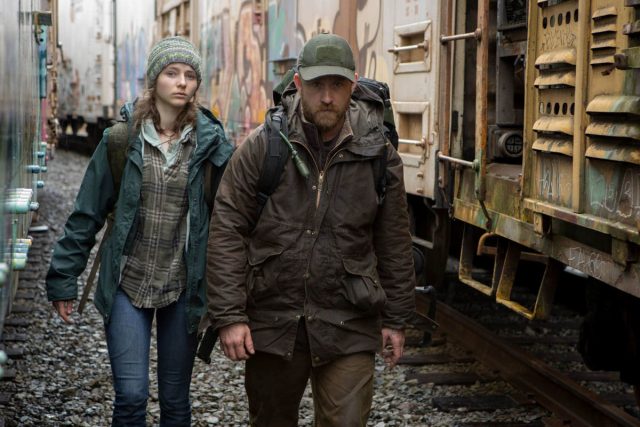Leave No Trace: Winter in the Northwest, by Rita Cannon
Eight years after her last narrative feature, Winter’s Bone, got a Best Picture nomination and launched Jennifer Lawrence to stardom, director Debra Granik is back with another somber but enthralling tale about a teenage girl growing up on the fringes of society and struggling to play the hand she’s been dealt by a wayward father. This time, the girl is thirteen-year-old Tom (the remarkable Thomasin Harcourt McKenzie), who has lived with her father Will (Ben Foster) in the woods of a state park outside Portland, Oregon for what seems like years. Will is a veteran, and seems to be dealing with PTSD or something like it. He’s completely content without any human companionship other than that of his daughter and the pair only occasionally travel into the city where they pick up food and supplies before promptly returning to the forest. Tom has never known any other life, and seems reasonably happy with the arrangement until they’re discovered by the authorities and their lives are forcibly disrupted.
Tom and Will’s relationship, acted beautifully by McKenzie and Foster, is a unique and profound one. After relying completely on each other for so long, they seem almost psychically linked, operating on a wavelength that no one else can access. But the more time they spend in civilized society, the clearer it becomes that Will can’t move beyond that wavelength–he might be incapable of fitting into a community of any kind while Tom not only fits in but thrives. Granik, as in her previous work, does an admirable job of depicting communities rarely seen in movies, and doesn’t draw a false or oversimplified dividing line between City People and Country People. The places Tom and Will live after being removed from the park — which include a farm and a sort of makeshift trailer park/commune — would be viewed by most city-dwellers as rural outposts, but they’re still too confining for Will. There are (literally) miles and miles of middle ground between Portland and the deep woods, but he can’t bring himself to occupy any of it, even if it’s clearly what’s best for his daughter.
There’s already been a flurry of coverage anointing McKenzie as “the next Jennifer Lawrence,” which is obviously an irresistible headline, but she really is every bit as good here as Lawrence was in Winter’s Bone and sometimes in similar ways. Like Lawrence’s Ree, Tom is wise and self-reliant beyond her years. McKenzie carries herself with a quiet self-possession that would be striking in any actor, but especially in one so young. Once Leave No Trace has gotten past its inciting incident, it mostly forgoes a conventional plot, instead clearing the way for us to simply observe two people as they bump up against their respective needs and limitations. This type of film puts an especially heavy burden on its actors to take us where we need to go, and McKenzie and Foster serve as compelling guides on Granik’s emotional journey.



























